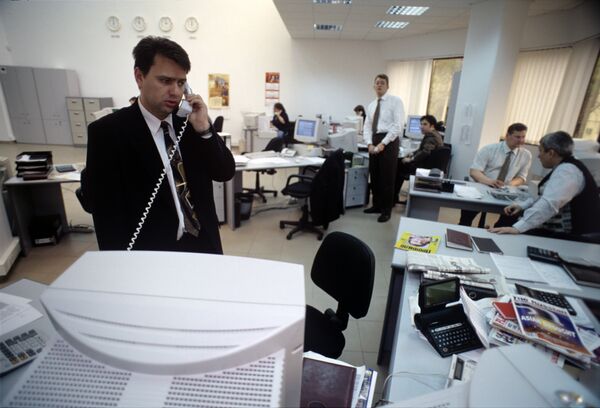The Russian government is ready to cut taxes, offer residence permits and abandon work permit quotas for foreign employees in an effort to attract more qualified professionals from abroad.
Will these policies help encourage a 'brain influx' to Russia? Who will agree to come to share their expertise and what will they ask in return?
On Wednesday May 12, lawmakers in the parliament's lower house adopted, in the third reading, amendments to a bill defining the legal status of foreign workers in Russia. The bill will essentially divide foreign workers into several major groups. Those arriving to work in the construction sector will have to apply to the Federal Migration Service for a work permit, as before, and the entry quota will remain in place for them. Foreign workers to be employed by individuals (such as household service staff) will have to buy a work license worth 1,000 rubles (about $30) a month. The payment will, in fact, work as an advance payment of income tax by the foreign employee.
However, the bill includes special provisions for another group, which is referred to as qualified professionals. To encourage an inflow of such professionals, primarily to the Skolkovo high-tech project, quotas will be cancelled starting from 2011. Employers will no longer have to prove to the migration authority how indispensable each of the proposed employees is or worry whether or not they will be included in the quota. Under the bill, the authority must issue a permit within 14 days. Moreover, qualified foreign professionals will receive three-year-work permits, rather than one-year ones, as is the case now. Professionals and their families will be given residence permits along with their work permits.
The bill will also create a better tax environment for professionals, as they will pay their income tax at the same flat rate as residents, 13%, rather than the current 30%.
The foreign workforce will be classified following the practice used in Germany: by income. To get into the privileged group, a foreign professional must be given a salary of about 2 million rubles a year (slightly over $5,500 a month at an exchange rate of 30 rubles to dollar). The government will also be authorized to change the threshold.
Will these policies help attract qualified professionals to Russia? They probably will. They will certainly boost foreign professionals' interest in Russia as a potential work destination.
The income tax cut to 13% is an important argument for a foreign employee, especially considering income tax rates in other countries. In India, for example, income tax is 30%, in the United States it is 35%, in Germany and China - 45%, and in Sweden - 56%.
At present, only those foreigners who have worked in Russia longer than six months are entitled to an equal rate with residents. Their taxes are recalculated retrospectively. "Many foreigners feel uneasy about this rule for two reasons: first, even with the prospect of recalculation, they are still reluctant to have 30% taken to the budget for six months," Nadezhda Zubkova from Grant Thornton business advisors' taxation department told RIA Novosti. "Second, if a foreign worker arrives in the second half of the year, for example in September, their taxes for September through December cannot be recalculated," she added. As a result, employers try to find loopholes, for example by paying their salaries via foreign bank cards.
But will Russia attract the professionals the government dreams of - the engines to drive modernization and innovation? Such professionals are in demand in every developed country. "Research professionals will arrive from India, South Asia, Africa and Europe," said Yelena Tyuryukanova, a migration expert at the Russian Academy of Sciences' Institute for Socioeconomic Problems. Not all of them can find good jobs in the United States or other countries that may seem more attractive in many respects than Russia. Working for three or four years in Russia gives them an opportunity for career growth that would have taken them ten years to arrive at in any other country. A 30%-50% salary rise and a substantial compensation package will sweeten the difficulties of moving to Russia.
Are foreigners willing to come to Russia? A 2009 survey by The Network suggests that only 7% of respondents would agree. Out of these, about 70% would agree to move to get a higher salary, and 58% are attracted by career growth. The survey put Russia in 32nd place in the ranking of 35 potential work destinations. The most attractive ones are the United States, the United Kingdom and Canada.
It is encouraging that 75% of the professionals that would agree to come to Russia have higher education degrees: the bachelor's or master's. A quarter of them are IT specialists - engineers, programmers and software developers. Many business executives are willing to come to Russia as well. Specifically, Finnish, Latvian and Ukrainian professionals named Russia as the most attractive country they would like to work in. Curiously enough, whatever their current occupation in their home country, one in three people surveyed mentioned they planned to work as consultant or manager in Russia.
The opinions expressed in this article are the author's alone and do not necessarily represent those of RIA Novosti.
MOSCOW. (Maria Selivanova, RIA Novosti economic commentator)



